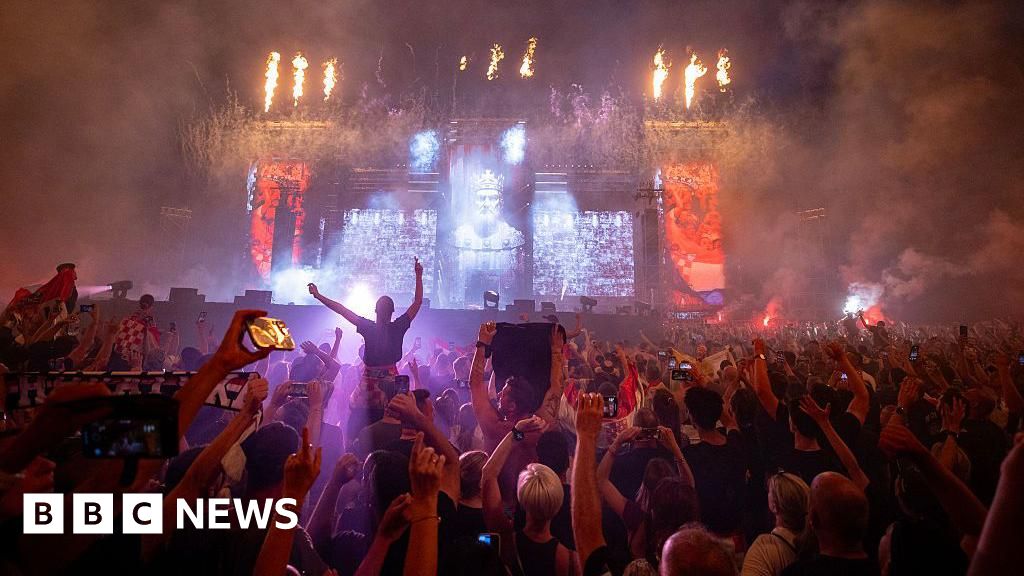生成中...【新闻趣摘】
"克罗地亚版伍德斯托克"还是"新法西斯主义大合唱"?克罗地亚民族主义歌手Thompson(本名Marko Perkovic)上月举行的超大型演唱会,把克罗地亚社会的深层撕裂暴露无遗——当台上高喊"为了祖国",台下数十万人齐声回应"时刻准备着"时,这个国家仿佛回到了上世纪90年代独立战争时期。最魔幻的是,执政党议员们也跟着一起喊,而人权组织则气得跳脚:这可是二战时期纳粹傀儡政权"克罗地亚独立国"的旧口号啊!历史学家Tvrtko Jakovina一语道破天机:"英国脱欧后,欧洲各地的法西斯观点都开始明目张胆了"。看来这场演唱会不仅是音乐盛宴,更成了克罗地亚社会的一面"照妖镜"——台上唱的是爱国,台下喊的可能是"政治不正确"的暗号呢!
---
**Croatian ultra-nationalist mega-gig exposes divided society**
克罗地亚极端民族主义演唱会暴露社会分裂
**A"neo-fascist Croatian Woodstock" or patriotic, anti-establishment fun? Last month's mega-gig by the ultra-nationalist singer Thompson – the stage name of Marko Perkovic – has dramatically exposed the polarised divisions deep within Croatian society.**
一场"新法西斯主义的克罗地亚伍德斯托克"还是爱国反建制的狂欢?上个月极端民族主义歌手Thompson(本名Marko Perkovic)的超级演唱会,戏剧性地暴露了克罗地亚社会深处的两极分化。
**It shone a spotlight on wildly differing interpretations of both the country's struggle for independence in the 1990s, and the history of the Independent State of Croatia (NDH), a World War Two-era Nazi puppet state.**
这场演唱会让人们对1990年代克罗地亚独立战争历史,以及二战时期纳粹傀儡政权"克罗地亚独立国"(NDH)的历史,产生了截然不同的解读。
**Nobody would argue that the concert was anything other than huge. Thompson's management claimed that more than half a million tickets for the show at Zagreb Hippodrome were sold. The actual attendance was considerably lower – but still in the hundreds of thousands.**
没人能否认这场演唱会的规模空前。Thompson的团队声称萨格勒布赛马场演出的门票售出超过50万张。实际到场人数要少得多——但仍有数十万之众。
**That enormous crowd enthusiastically joined in when Thompson launched into his opening number, Čavoglave Battalion. To his cry of"Za dom" ("for homeland"), the audience roared back"Spremni!" ("ready!"). MPs from the governing HDZ party were among those chanting along.**
当Thompson唱响开场曲《恰沃格拉夫营》时,庞大的人群热情高涨。他对"Za dom"("为了祖国")的呼喊,得到了观众"Spremni!"("时刻准备着!")的响亮回应。执政党克罗地亚民主共同体(HDZ)的议员们也加入了合唱。
**This chant has outraged opposition parties and organisations working for human rights and ethnic and regional reconciliation. They point out that"Za dom, spremni" originated with the anti-Semitic, Nazi-allied Ustasha organization during World War Two – and that Croatia's Constitutional Court has ruled that the phrase"is an Ustasha salute of the Independent State of Croatia [which is] not in accordance with the Constitution of the Republic of Croatia".**
这句口号激怒了反对党和致力于人权及民族和解的组织。他们指出"Za dom, spremni"源自二战时期反犹、亲纳粹的乌斯塔沙组织——克罗地亚宪法法院已裁定该短语"是克罗地亚独立国的乌斯塔沙敬礼,不符合克罗地亚共和国宪法"。
**"This has opened Pandora's box," says Tena Banjeglav of Documenta – Centre for Dealing with the Past, an organisation which focuses on reconciliation by taking a factual approach to both World War Two and the more recent war of independence.**
"这打开了潘多拉魔盒,"致力于通过事实方法促进二战和近期独立战争和解的"Documenta-处理过去中心"的Tena Banjeglav说。
**"You've now got politicians in parliament screaming 'Za dom, spremni'. On the streets, kids are singing not only that song, but other songs Thompson used to sing which glorify mass crimes in World War Two," she says."The government is creating an atmosphere when this is a positive thing. It is creating a wave of nationalism which could explode into physical violence."**
"现在议会里有政客高喊'Za dom, spremni'。街上孩子们不仅唱这首歌,还唱Thompson过去演唱的歌颂二战大规模罪行的其他歌曲,"她说。"政府正在营造一种这是积极事物的氛围。这正在掀起可能演变成肢体暴力的民族主义浪潮。"
**The government has in fact downplayed the chanting at the concert. Prime Minister Andrej Plenkovic described it as"part of Thompson's repertoire" and posed for a photo with the singer the day before the Zagreb gig.**
政府实际上淡化了演唱会上的口号。总理安德烈·普连科维奇称这是"Thompson曲目的一部分",并在萨格勒布演唱会前一天与这位歌手合影。
**Conservative commentator Matija Štahan believes that Thompson's time serving as a soldier during the war of independence gives him the right to use"Za dom, spremni" in his work.**
保守派评论员Matija Štahan认为,Thompson在独立战争中服役的经历赋予他在作品中使用"Za dom, spremni"的权利。
**"It is an authentic outcry for freedom against aggression," he says."Many journalists in the West say it's the Croatian version of 'Heil Hitler' – but it would be best to describe it as the Croatian version of [the Ukrainian national salute] 'Slava Ukraini'."**
"这是反抗侵略、追求自由的真挚呐喊,"他说。"许多西方记者说这是克罗地亚版的'希特勒万岁'——但最好将其描述为克罗地亚版的[乌克兰国家敬语]'荣耀归于乌克兰'。"
**"Both rose to prominence in the context of World War Two – which was a war for many small nations who wanted their own independent states," Mr Štahan says."Symbols change their meaning – and just like 'Slava Ukraini', 'Za dom, spremni' also means something different. Today, it's an anti-establishment nationalist slogan. It's against the Croatian politically-correct post-communist political elite. Young people want to shout it as something that's subversive."**
"两者都是在二战背景下崭露头角的——二战是许多想要独立国家的小民族的战争,"Štahan说。"符号会改变其含义——就像'Slava Ukraini'一样,'Za dom, spremni'也有了不同的含义。今天,这是一个反建制的民族主义口号。它反对克罗地亚政治正确的后共产主义政治精英。年轻人想把它作为一种颠覆性的东西喊出来。"
**This interpretation cuts no ice with the Youth Initiative for Human Rights (YIHR), a regional organisation which works for reconciliation among the younger generations in the Western Balkans.**
这种解释对致力于西巴尔干地区年轻一代和解的区域组织"青年人权倡议"(YIHR)毫无说服力。
**"It is clearly a fascist slogan," says YIHR's director in Croatia, Mario Mažić."As an EU member state, Croatia should be an example for the rest of the region, but it has not dealt with the past. It identifies with the losing side in World War Two, doesn't recognise it waged an unjust war in Bosnia and refuses to acknowledge systematic crimes against Serbs."**
"这显然是一个法西斯口号,"YIHR克罗地亚主任Mario Mažić说。"作为欧盟成员国,克罗地亚应该成为该地区其他国家的榜样,但它没有处理好过去。它认同二战中的失败一方,不承认在波斯尼亚发动了不公正的战争,并拒绝承认对塞尔维亚人的系统性罪行。"
**Brexit was the breaking point for fascist views becoming more visible, according to Tvrtko Jakovina**
历史学家Tvrtko Jakovina认为,英国脱欧是法西斯观点变得更加明显的转折点。

